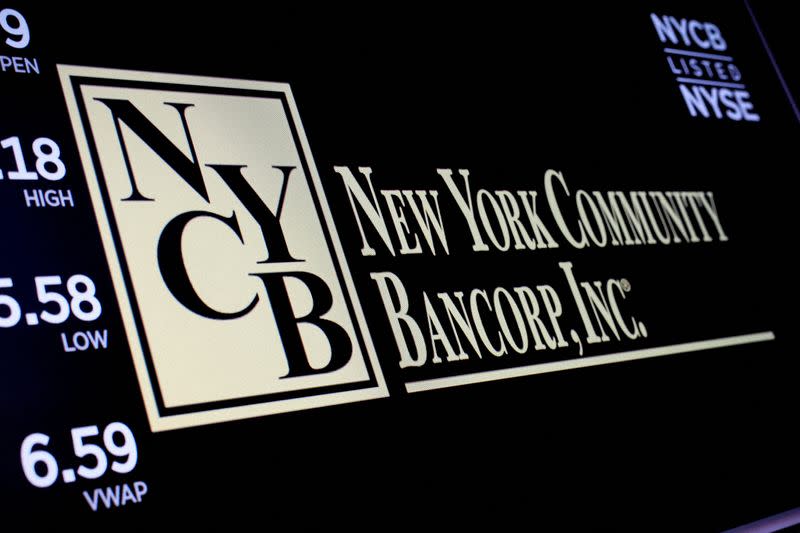NYCB eyes potential loan book sales, deposits shrink 7%

By Niket Nishant, Manya Saini and Tatiana Bautzer
(Reuters) -New York Community Bank is seeing interest from non-bank bidders for some of its loans and will outline a new business plan next month, its new CEO said on Thursday after the bank slashed its dividend again and disclosed deposits fell 7%.
The bank's shares rose 7% on Thursday after swinging between gains and losses over the last two days, with periodic trading halts that underscored lingering uncertainty about its finances.
Joseph Otting, former Comptroller of the Currency in the Trump administration, was named NYCB's CEO on Wednesday as part of a $1 billion capital injection from a group of investors that included former Treasury Secretary Steven Mnuchin.
In a bid to shore up confidence, Otting and Non-Executive Chair Alessandro DiNello told analysts on Thursday that they would soon unveil a new business plan and had closely scrutinized the bank's books, and provided insight on deposit flows.
"I've spent a fair amount of time getting to know the organization from afar and then a significant amount of time conducting due diligence on the portfolio and the balance sheet," Otting said, noting that NYCB had a "strong liquidity position."
NYCB has been trying to arrest a persistent stock rout that has wiped billions off its market value, almost a year after the collapse of Silicon Valley Bank and Signature Bank ignited widespread concerns over the health of the sector.
While most analysts had cheered the capital injection and management overhaul, some remain concerned about NYCB's future, saying the bank still has a long way to go to repair the damage.
At least three brokerages cut their price targets on the stock after the deal was announced.
"While this deal provides a much-needed lifeline to NYCB, it is tremendously dilutive to common shareholders," analysts at Wedbush said. In exchange for their capital, NYCB's investors bought common shares at $2 each, along with preferred stock.
NYCB has also pledged to reduce its exposure to the commercial real estate (CRE) industry, after taking huge provisions in the fourth quarter for potential bad loans tied to the sector. Empty office buildings in the post-pandemic era and steep borrowing costs have worsened worries of debt defaults.
In an interview with CNBC, Mnuchin said on Thursday that he had explored a merger between NYCB when he was chair of OneWest Bank a decade ago and had also studied NYCB's purchase of failed Signature Bank assets last year.
"So I have been following it, and more recently when they did the Signature Bank deal I followed it as well, which I think was a very attractive deal for them," he said.
Top executives on Thursday did not answer questions on the portfolios that NYCB could divest to reduce its big exposure to the ailing commercial real estate (CRE) sector and raise capital.
A surprise quarterly loss and a 70% reduction of its dividend in January hammered NYCB's stock, which came under pressure again last week after it said it had found "material weakness" in internal controls and revised its loss to 10 times higher than earlier due to a goodwill impairment charge.
DEPOSIT DECLINE
NYCB reported total deposits of $77.2 billion as of March 5, lower than $83 billion a month ago. About 19.8% of the deposits were uninsured.
Compared with peers, it has the lowest concentration of uninsured deposits and has disclosed it has enough liquidity to offer its customers expanded deposit insurance.
DiNello said some people lined up to withdraw their deposits on Wednesday after media reports said NYCB was seeking capital, but that stabilized later in the afternoon once the company's press release was out.
The bank also reduced its quarterly dividend to 1 cent per share, lower than the 5 cents it announced in January.
Otting, the third to take the top job in weeks, is a banking industry veteran who served as the 31st Comptroller of the Currency. He is credited with reviving IndyMac, a mortgage lender Mnuchin bought out of the Federal Deposit Insurance Corporation's receivership in 2009 with an investor group.
"Even the link with the OCC (Office of the Comptroller of the Currency) may not be the glowing endorsement that it seems, given that it was the OCC waived through NYCB's acquisition spree that has done so much to get it in trouble in the first place," said Russ Mould, investment director at AJ Bell.
NYCB's acquisition of Flagstar Bank in 2022 and Signature Bank's assets last year pushed its assets above $100 billion, subjecting it to tougher regulations imposed on lenders of that scale.
The OCC approved NYCB's deal with Flagstar even though other regulators feared it could create problems at the New York bank, Reuters reported on Thursday.
(Reporting by Manya Saini, Niket Nishant and Mehnaz Yasmin in Bengaluru; Editing by Devika Syamnath and Nick Zieminski)

 Yahoo Finance
Yahoo Finance 